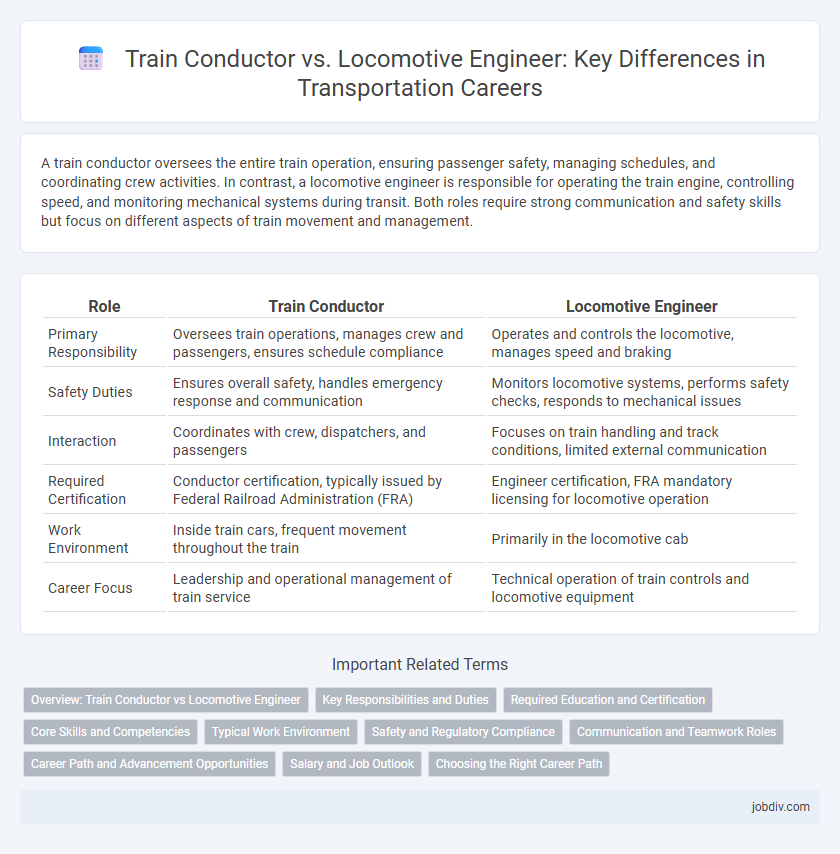A train conductor oversees the entire train operation, ensuring passenger safety, managing schedules, and coordinating crew activities. In contrast, a locomotive engineer is responsible for operating the train engine, controlling speed, and monitoring mechanical systems during transit. Both roles require strong communication and safety skills but focus on different aspects of train movement and management.
Table of Comparison
| Role | Train Conductor | Locomotive Engineer |
|---|---|---|
| Primary Responsibility | Oversees train operations, manages crew and passengers, ensures schedule compliance | Operates and controls the locomotive, manages speed and braking |
| Safety Duties | Ensures overall safety, handles emergency response and communication | Monitors locomotive systems, performs safety checks, responds to mechanical issues |
| Interaction | Coordinates with crew, dispatchers, and passengers | Focuses on train handling and track conditions, limited external communication |
| Required Certification | Conductor certification, typically issued by Federal Railroad Administration (FRA) | Engineer certification, FRA mandatory licensing for locomotive operation |
| Work Environment | Inside train cars, frequent movement throughout the train | Primarily in the locomotive cab |
| Career Focus | Leadership and operational management of train service | Technical operation of train controls and locomotive equipment |
Overview: Train Conductor vs Locomotive Engineer
Train conductors oversee the overall operation and safety of passenger and freight trains, managing crew coordination and customer service. Locomotive engineers are responsible for operating the train's engine, controlling speed, braking, and ensuring compliance with signaling systems. Both roles require specialized training and certification, with conductors focusing on train operations management and engineers concentrating on driving and technical operation.
Key Responsibilities and Duties
Train conductors oversee passenger safety, coordinate train crew activities, and manage ticketing and customer service, ensuring smooth station operations. Locomotive engineers operate and control the train's locomotive, monitor mechanical systems, and adhere to schedules and safety protocols during transit. Both roles require precise communication and strict compliance with federal railway regulations to maintain efficient and secure rail transportation.
Required Education and Certification
Train conductors typically require a high school diploma or GED along with specialized on-the-job training, focusing on safety procedures, communication, and operational rules. Locomotive engineers must complete a formal apprenticeship or training program and obtain certification from the Federal Railroad Administration (FRA), which includes passing a written test and periodic recertification. Both roles demand thorough knowledge of railroad regulations and safety protocols, but engineers face more stringent certification to operate the train's mechanical systems.
Core Skills and Competencies
Train conductors excel in passenger communication, safety oversight, and operational coordination, ensuring smooth boarding and adherence to schedules. Locomotive engineers specialize in train operation, controlling speed, braking systems, and monitoring mechanical performance to maintain optimal functionality. Both roles require strong situational awareness, problem-solving skills, and thorough knowledge of railway regulations.
Typical Work Environment
Train conductors typically work both on board trains and at station platforms, coordinating passenger boarding, ticket inspections, and safety protocols in diverse weather conditions. Locomotive engineers primarily operate in the locomotive cab, managing train speed, braking, and adherence to signals within various rail environments ranging from urban tracks to remote rural routes. Both roles often require extended hours and vigilance in high-noise, vibration-prone settings to ensure safe and timely rail operations.
Safety and Regulatory Compliance
Train conductors ensure passenger safety by managing onboard operations and coordinating emergency protocols, adhering strictly to Federal Railroad Administration (FRA) safety regulations. Locomotive engineers focus on operating trains safely, maintaining speed limits, and complying with signal systems, following guidelines set by the FRA and Occupational Safety and Health Administration (OSHA). Both roles require rigorous training and certification to uphold the highest standards of regulatory compliance and prevent accidents.
Communication and Teamwork Roles
Train conductors coordinate with station staff and passengers to ensure smooth boarding and adherence to schedules, facilitating clear communication throughout the journey. Locomotive engineers focus on operating the train safely and efficiently, maintaining constant communication with conductors and dispatchers to monitor track conditions and signal changes. Both roles require strong teamwork to synchronize operations, manage emergencies, and deliver seamless transportation services.
Career Path and Advancement Opportunities
Train conductors typically begin their careers in entry-level roles such as brakemen or flagmen before advancing to conductors through on-the-job training and certification, focusing on managing train operations and passenger safety. Locomotive engineers require specialized training and certification to operate trains, often advancing from roles as conductors or assistant engineers, with career progression leading to senior engineer positions or supervisory roles. Both career paths offer opportunities for advancement through experience, additional certifications, and leadership positions within the rail industry.
Salary and Job Outlook
Train conductors earn an average annual salary of $60,000, with variations depending on experience and location, while locomotive engineers typically make higher wages, averaging around $75,000 per year. Job outlook for both positions shows steady growth, with locomotive engineers expected to grow by 8% and train conductors by 5% over the next decade due to expanding rail networks and passenger demand. Employment stability remains strong, supported by increased investments in railroad infrastructure and safety regulations.
Choosing the Right Career Path
Train conductors manage passenger safety, ticketing, and schedule coordination, making them ideal for individuals who excel in customer service and multitasking. Locomotive engineers operate and control train engines, requiring strong technical skills and attention to detail for safe and efficient train movement. Choosing between these careers depends on whether one prefers hands-on mechanical operation or supervisory and communication responsibilities within the rail industry.
Train Conductor vs Locomotive Engineer Infographic

 jobdiv.com
jobdiv.com